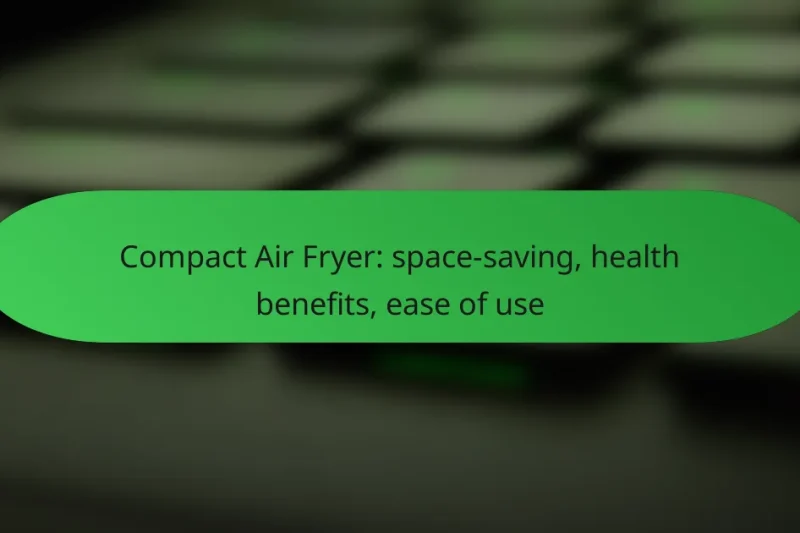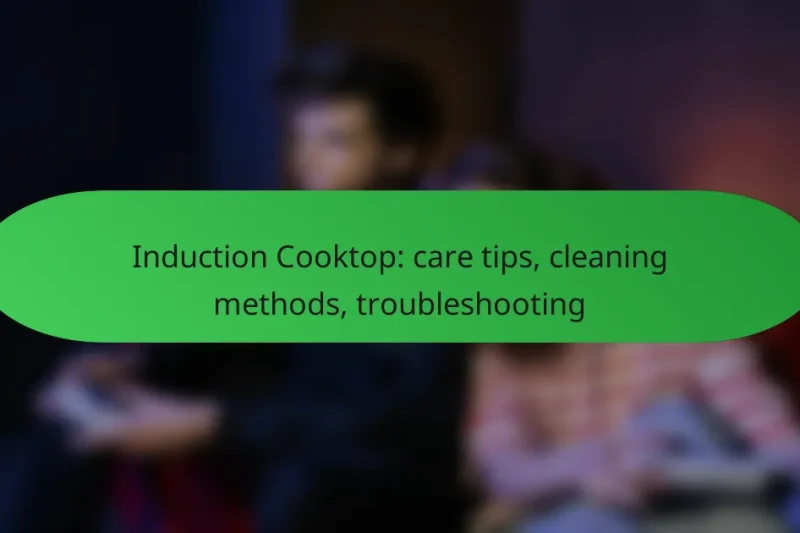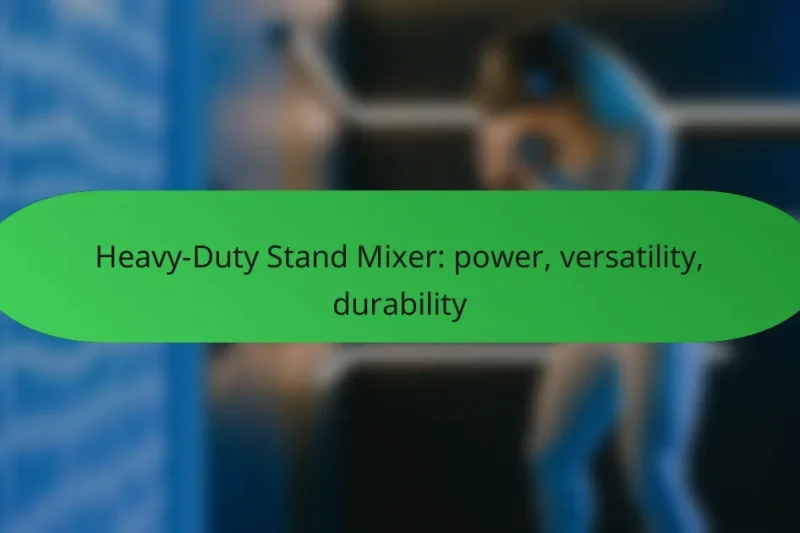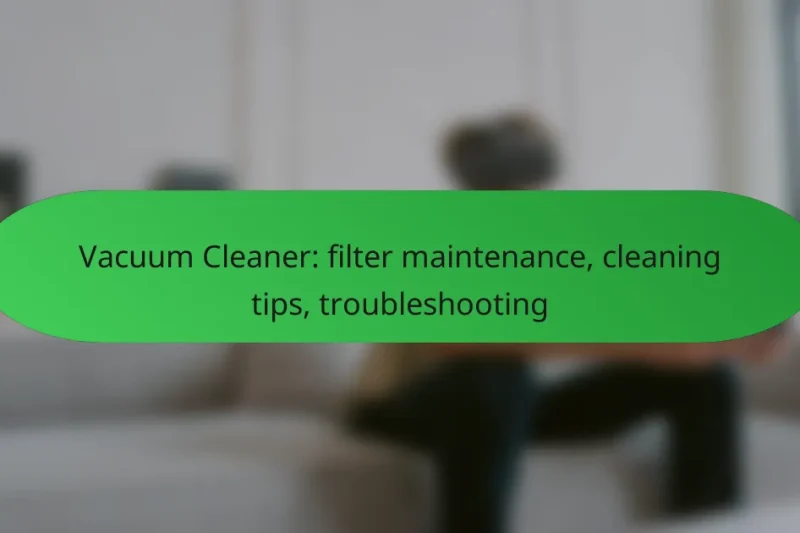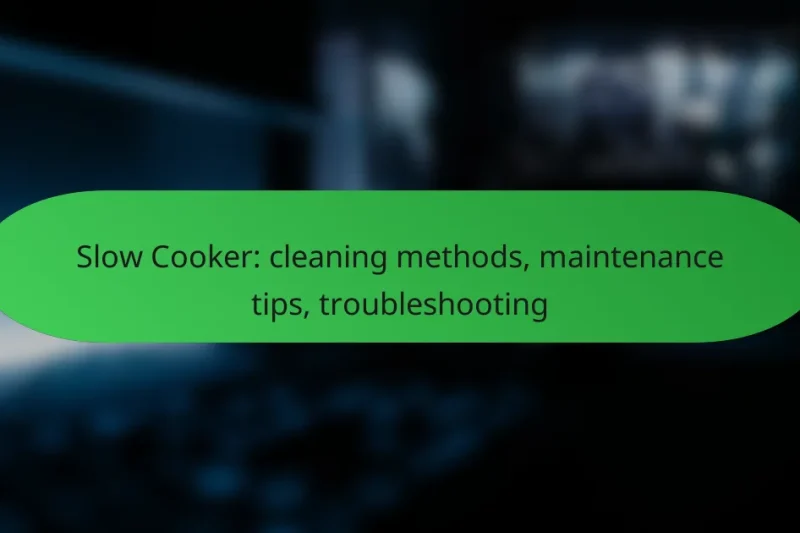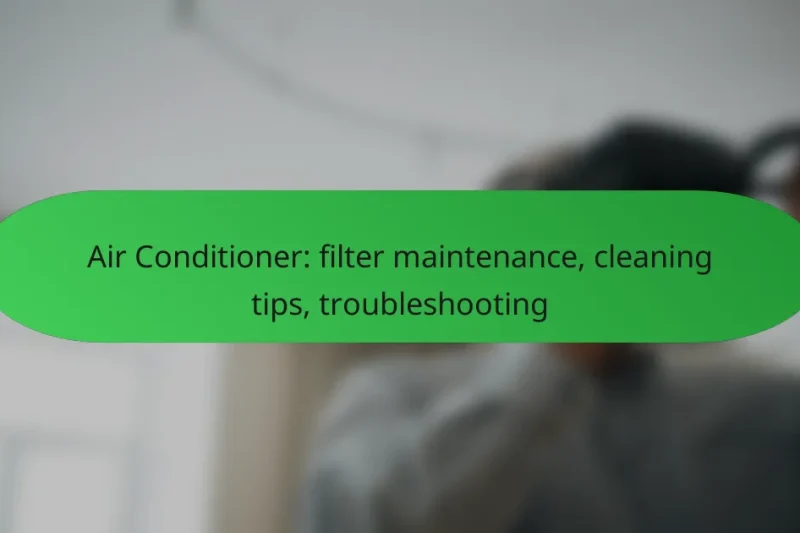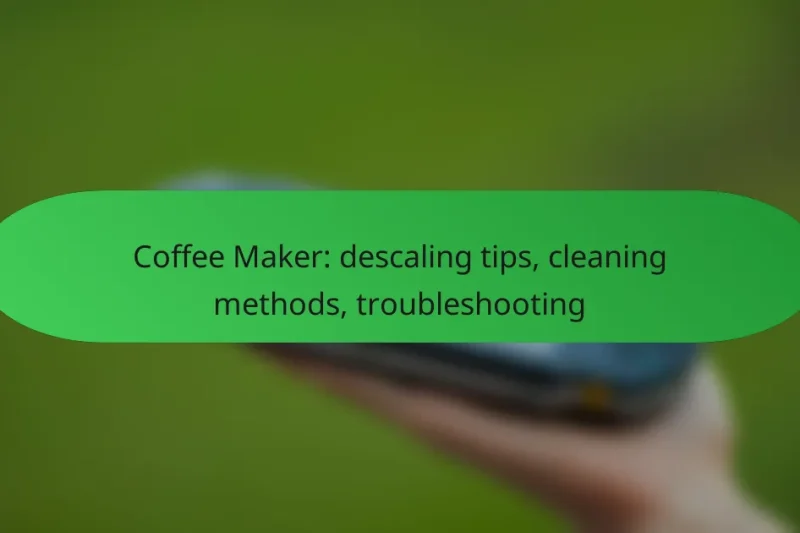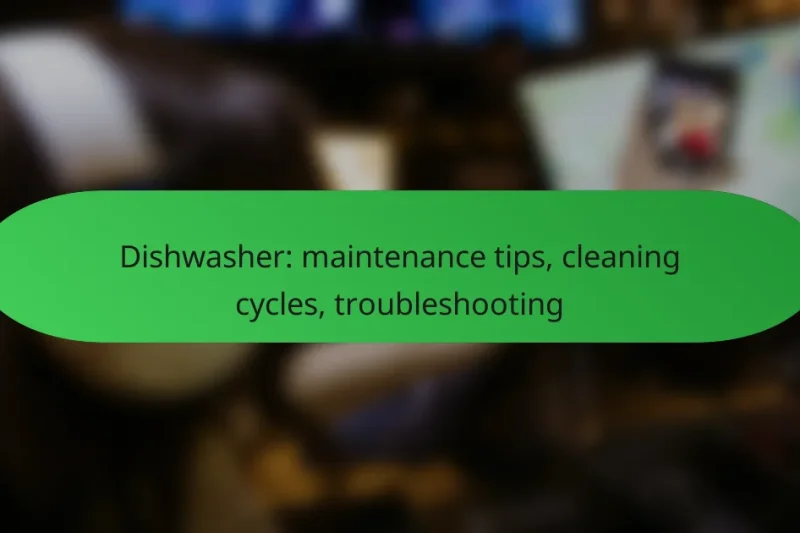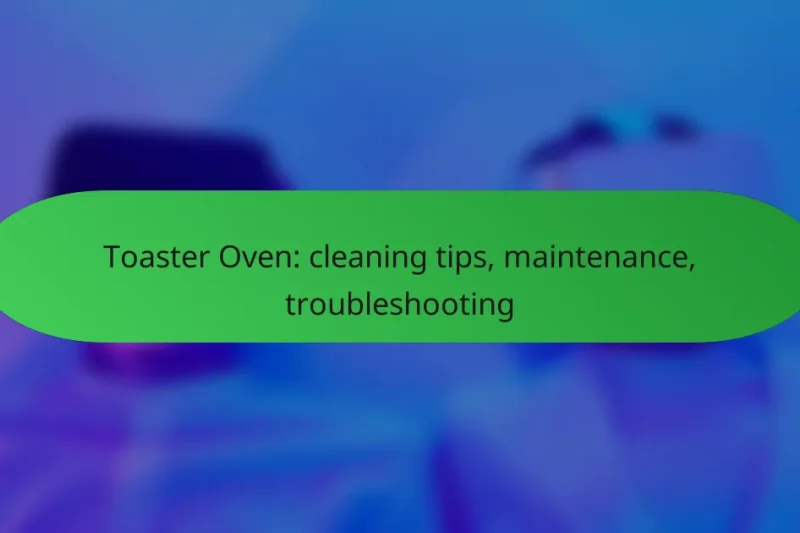A compact air fryer is the perfect solution for those with limited kitchen space, offering efficient … Compact Air Fryer: space-saving, health benefits, ease of useRead more
Maintaining and Troubleshooting Home Appliances
Maintaining and troubleshooting home appliances is essential for ensuring their longevity and efficiency. Common issues can arise with appliances like washing machines, refrigerators, and ovens, leading to increased energy costs and potential safety hazards. By understanding basic troubleshooting techniques and implementing regular maintenance practices, homeowners can effectively address problems and keep their appliances running smoothly.
Induction Cooktop: care tips, cleaning methods, troubleshooting
Induction cooktops offer a modern and efficient cooking experience, but proper care is essential for optimal … Induction Cooktop: care tips, cleaning methods, troubleshootingRead more
Heavy-Duty Stand Mixer: power, versatility, durability
A heavy-duty stand mixer is an essential tool for any serious baker, combining power, versatility, and … Heavy-Duty Stand Mixer: power, versatility, durabilityRead more
Vacuum Cleaner: filter maintenance, cleaning tips, troubleshooting
Proper maintenance of vacuum cleaner filters is essential for ensuring efficient performance and prolonging the life … Vacuum Cleaner: filter maintenance, cleaning tips, troubleshootingRead more
Slow Cooker: cleaning methods, maintenance tips, troubleshooting
Maintaining your slow cooker is crucial for ensuring its longevity and performance. Effective cleaning methods and … Slow Cooker: cleaning methods, maintenance tips, troubleshootingRead more
Air Conditioner: filter maintenance, cleaning tips, troubleshooting
Proper maintenance of air conditioner filters is essential for ensuring optimal performance and improving air quality. … Air Conditioner: filter maintenance, cleaning tips, troubleshootingRead more
Coffee Maker: descaling tips, cleaning methods, troubleshooting
Maintaining your coffee maker is crucial for enjoying consistently great-tasting coffee. Regular descaling and cleaning help … Coffee Maker: descaling tips, cleaning methods, troubleshootingRead more
Electric Kettle: descaling tips, maintenance, troubleshooting
Proper maintenance of your electric kettle is crucial for ensuring its longevity and optimal performance. Regular … Electric Kettle: descaling tips, maintenance, troubleshootingRead more
Dishwasher: maintenance tips, cleaning cycles, troubleshooting
Proper maintenance of your dishwasher is essential for ensuring its efficiency and longevity. Regular tasks such … Dishwasher: maintenance tips, cleaning cycles, troubleshootingRead more
Toaster Oven: cleaning tips, maintenance, troubleshooting
Keeping your toaster oven clean and well-maintained is crucial for optimal performance and longevity. Regular cleaning … Toaster Oven: cleaning tips, maintenance, troubleshootingRead more
What are common home appliance problems in the UK?
Common home appliance problems in the UK include issues with washing machines, refrigerators, ovens, dishwashers, and boilers. These problems can lead to inefficiencies, increased energy costs, and potential safety hazards if not addressed promptly.
Faulty washing machines
Washing machines often experience issues such as leaks, failure to spin, or not filling with water. Regular maintenance, including checking hoses for wear and ensuring the door seals are intact, can help prevent these problems.
If your washing machine is making unusual noises, it may indicate a problem with the drum or motor. It’s advisable to consult a technician if the noise persists after checking for loose items inside.
Malfunctioning refrigerators
Refrigerators can malfunction by not cooling properly, making strange noises, or leaking water. Ensure that the door seals are clean and intact, as poor sealing can lead to temperature issues.
For cooling problems, check the thermostat settings and clean the condenser coils. If the refrigerator is still not functioning correctly, it may require professional servicing.
Broken ovens
Common oven issues include uneven heating, failure to ignite, or a malfunctioning timer. Regularly cleaning the oven can prevent buildup that affects performance, especially around the burners and heating elements.
If your oven is not heating, check the power supply and ensure that the settings are correct. Persistent issues may necessitate a technician’s assessment to check for electrical faults.
Leaky dishwashers
Dishwashers can leak due to worn door seals, clogged filters, or faulty hoses. Regularly inspect the door seals for cracks and clean the filters to prevent blockages that can lead to leaks.
If you notice water pooling under the dishwasher, turn it off immediately and check the hoses for any signs of damage. Replacing worn parts promptly can save you from more extensive repairs later.
Heating issues in boilers
Boilers may experience heating issues such as inconsistent temperatures or complete failure to heat water. Regular servicing is essential to ensure that the boiler operates efficiently and safely.
Check the pressure gauge; if it’s below the recommended level, you may need to repressurize the system. If problems persist, contact a qualified technician to inspect for faults or leaks, as these can pose safety risks.
How can I troubleshoot my washing machine?
To troubleshoot your washing machine, start by identifying common issues such as power supply problems, door latch malfunctions, or water supply issues. Systematically checking these areas can help you quickly resolve the problem and get your appliance back in working order.
Check power supply
Begin by ensuring that your washing machine is plugged in and that the outlet is functioning. You can test the outlet by plugging in another device to see if it receives power. If the outlet is operational, check the circuit breaker to ensure it hasn’t tripped.
If the power supply appears normal but the machine still won’t start, inspect the power cord for any visible damage. A frayed or broken cord may need replacement to restore functionality.
Inspect door latch
The door latch is a critical safety feature that prevents the washing machine from operating when the door is open. Ensure that the door is fully closed and that the latch engages properly. If the latch is damaged or misaligned, it may need adjustment or replacement.
Listen for a clicking sound when closing the door, which indicates that the latch is functioning correctly. If you do not hear this sound, the latch may be faulty, and you should consider replacing it to avoid further issues.
Examine water supply
A washing machine requires a steady water supply to function properly. Check that the water valves are turned on and that hoses are not kinked or blocked. Inspect the hoses for any leaks or signs of wear, as damaged hoses can lead to water supply issues.
If the water supply is adequate but the machine is not filling, the inlet valves may be clogged or defective. Cleaning or replacing these valves can often resolve the issue and restore proper water flow.
What are the best practices for maintaining refrigerators?
To maintain refrigerators effectively, focus on regular cleaning, ensuring door seals are intact, and monitoring temperature settings. These practices help improve efficiency, prolong lifespan, and reduce energy costs.
Regular cleaning of coils
Cleaning the condenser coils is essential for optimal refrigerator performance. Dust and debris can accumulate on the coils, causing the appliance to work harder and consume more energy. Aim to clean the coils every six months using a vacuum or a coil brush.
When cleaning, ensure the refrigerator is unplugged for safety. Pay attention to the area behind and beneath the fridge, as these spots often collect dirt. Regular maintenance can lead to energy savings of up to 15%.
Checking door seals
Door seals play a crucial role in maintaining the refrigerator’s temperature. A damaged or dirty seal can lead to cold air escaping, forcing the appliance to use more energy to maintain the desired temperature. Inspect seals regularly for cracks or tears.
To test the seal’s effectiveness, close the door on a piece of paper; if you can easily pull it out, the seal may need replacement. Cleaning the seals with warm, soapy water can also enhance their performance.
Monitoring temperature settings
Keeping the refrigerator at the right temperature is vital for food safety and energy efficiency. The ideal temperature range for refrigerators is between 1°C and 4°C (34°F to 40°F). Use a thermometer to check the internal temperature regularly.
Avoid overloading the fridge, as this can obstruct airflow and lead to uneven cooling. Additionally, ensure that the refrigerator is not placed near heat sources, which can affect its ability to maintain the correct temperature.
How do I fix a broken oven?
To fix a broken oven, start by identifying common issues such as faulty heating elements, thermostat problems, or electrical connection failures. Troubleshooting these areas can often resolve the problem without needing professional help.
Inspect heating elements
Begin by checking the heating elements, which are essential for cooking. Look for visible signs of damage, such as cracks or breaks, and test them with a multimeter to ensure they are functioning correctly.
If the heating elements are not working, they may need to be replaced. Replacement elements can typically be found at appliance repair stores or online, and installation usually involves unscrewing the old element and connecting the new one.
Check oven thermostat
The oven thermostat regulates the temperature inside the oven, so a malfunction can lead to cooking issues. Use an oven thermometer to compare the actual temperature with the set temperature; discrepancies may indicate a faulty thermostat.
If the thermostat is not accurate, it may need recalibration or replacement. Consult the oven’s manual for specific instructions on how to adjust or replace the thermostat.
Examine electrical connections
Electrical connections are crucial for the oven’s operation. Inspect the power cord and plug for any signs of wear or damage, and ensure that the outlet is functioning properly by testing it with another appliance.
If you suspect an issue with the wiring, it’s advisable to consult a professional electrician. Loose or damaged wiring can pose safety hazards and should be addressed promptly to avoid further complications.
What steps should I take for dishwasher maintenance?
For effective dishwasher maintenance, focus on regular cleaning and inspections to ensure optimal performance. Simple tasks like cleaning filters, inspecting spray arms, and checking the water inlet valve can significantly extend the lifespan of your appliance.
Clean filters regularly
Cleaning the dishwasher filters is crucial for maintaining efficiency. Most dishwashers have a filter located at the bottom that traps food particles and debris. Aim to clean this filter every month to prevent clogs and ensure proper drainage.
To clean the filter, remove it according to the manufacturer’s instructions, rinse it under warm water, and scrub any stubborn residue with a soft brush. Regular cleaning helps maintain water flow and improves washing performance.
Inspect spray arms
Inspecting the spray arms is essential for ensuring that water reaches all areas of your dishes. Over time, spray arms can become clogged with food particles or mineral deposits. Check them periodically for blockages and ensure they can rotate freely.
If you notice any clogs, remove the spray arms and rinse them under warm water. You can use a toothpick to clear any small holes. Keeping the spray arms clean will enhance the dishwasher’s cleaning ability and prevent uneven washing.
Check water inlet valve
The water inlet valve controls the flow of water into the dishwasher, making it vital for proper operation. If your dishwasher is not filling with water, the inlet valve may be blocked or malfunctioning. Inspect it regularly to ensure it is functioning correctly.
To check the valve, locate it at the bottom of the appliance and inspect for any signs of wear or blockage. If necessary, clean or replace the valve to maintain optimal water flow. Regular checks can help avoid costly repairs and ensure your dishwasher runs smoothly.
How can I ensure my boiler operates efficiently?
To ensure your boiler operates efficiently, regular maintenance and timely servicing are essential. Keeping the system clean and addressing any issues promptly can significantly enhance performance and longevity.
Annual servicing
Annual servicing of your boiler is crucial for maintaining efficiency and safety. A qualified technician will inspect key components, clean the system, and ensure it meets local regulations, which can help prevent breakdowns and costly repairs.
During servicing, the technician will check for leaks, test pressure levels, and clean the burner and heat exchanger. It is advisable to schedule this service before the heating season begins, typically in the fall, to ensure your system is ready for winter demands.
Consider keeping a record of all service appointments and any repairs made. This documentation can be beneficial for warranty claims and can help you track the performance of your boiler over time.
